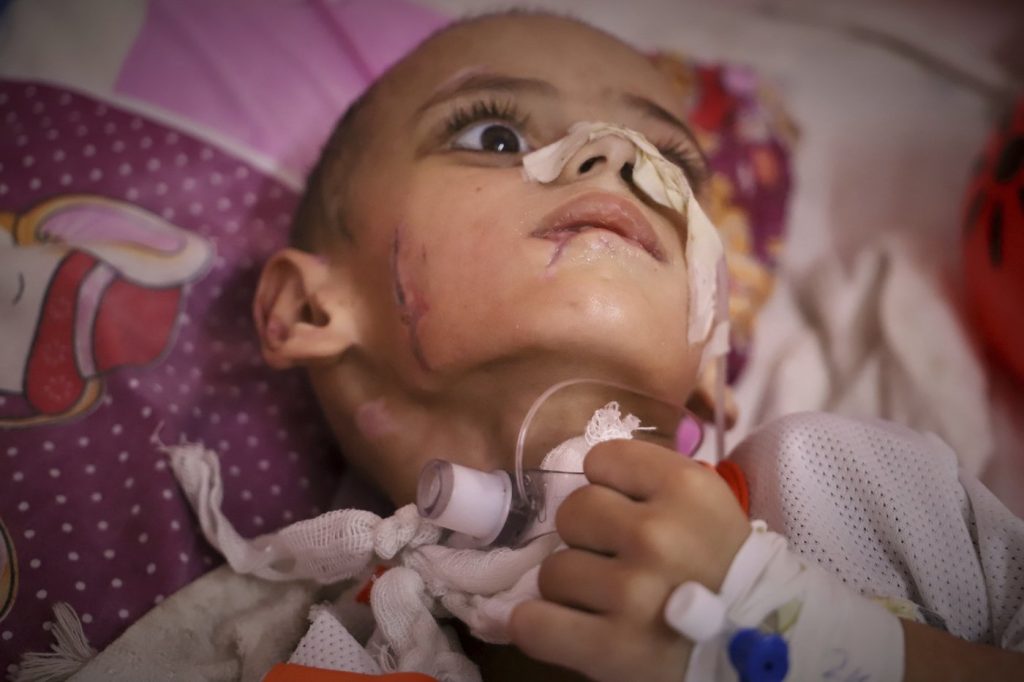BEIRUT (AP) — The tragic story of 3-year-old Amr al-Hams epitomizes the harrowing impact of Israel's war in Gaza. The young boy, who is currently in critical condition, has shrapnel embedded in his brain due to an Israeli airstrike that struck his family's tent. His pregnant mother was killed in the attack, leaving his father utterly devastated by the loss of his long-time partner.
Amr now finds himself in a hospital bed at Nasser Hospital in Khan Younis, unable to speak or move, and progressively losing weight due to a lack of medical supplies necessary to treat his severe brain injuries. His doctors, overwhelmed by the ongoing conflict, cannot provide the rehabilitation care he desperately needs, which has been exacerbated by a prolonged blockade and relentless bombings that have decimated the health care system in Gaza.
The conflict escalated dramatically on October 7, 2023, when Hamas militants launched an attack in Israel, resulting in the deaths of approximately 1,200 individuals, primarily civilians. In response, Israel's retaliatory actions have claimed the lives of over 57,000 Palestinians, according to the Gaza Health Ministry. This staggering figure underscores the immense human toll of the ongoing conflict, as most casualties are reported to be women and children.
Nearly 21 months into this devastating conflict, medical care for critically wounded individuals like Amr is becoming increasingly scarce. Approximately half of the 36 hospitals in Gaza are non-operational, and the remaining medical facilities are inundated with casualties and resource shortages, affecting everything from basic supplies like gauze to more complex equipment like respirators and scanners.
Israeli military operations have resulted in raids on medical facilities, alleging that Hamas has used hospitals as command centers, further complicating the healthcare landscape. Many doctors have either been killed or displaced, unable to reach their hospitals amid the ongoing violence.
For over two and a half months, Israel imposed a blockade preventing food, medicine, and other essential supplies from entering Gaza, exacerbating the humanitarian crisis and pushing the population toward starvation. Since mid-May, some limited aid, including medical supplies, has trickled into the territory, yet the overall supply remains grossly inadequate to meet the population's needs.
According to Gaza’s Health Ministry, an estimated 33,000 children have sustained injuries during the conflict, with 5,000 requiring long-term rehabilitation and critical care. Over 1,000 children, like Amr, are now living with severe medical conditions such as brain or spinal injuries and amputations.
Tanya Haj-Hassan, a pediatric intensive care specialist who has volunteered in Gaza, states that the future of young victims like Amr is bleak due to the systematic targeting and destruction of the health system, which could have prevented many of these injuries.
Amr’s tragic story begins in April when his mother, Inas, took him and his father to visit her parents in northern Gaza just a week before her due date. Tragically, an Israeli airstrike hit their location during dinner, resulting in the deaths of Inas, her unborn child, Amr's grandfather, and his siblings. Amr was hurried to the ICU at the Indonesian Hospital, where scans revealed brain damage.
After a brief evacuation to Shifa Hospital, where conditions were dire due to overwhelming numbers of casualties, Amr's father and aunt transported him south to Nasser Hospital in a motorized rickshaw. Amr faced significant pain during the 25-kilometer journey and required immediate admission to the ICU upon arrival due to critically low oxygen levels.
Unfortunately, Nasser Hospital was still unable to provide the extensive care that Amr needed, facing shortages of intravenous nutrients and specialized milk for his condition. Amr’s aunt, Nour, who is a trained nurse, has been his primary caregiver, providing makeshift feeding through a syringe connected to his stomach and enduring daily challenges of scarcity in Gaza.
The impact of missed medical care on Amr's development could be profound, as immediate and ongoing treatment for brain injuries is critical for recovery. Currently, there are over 10,000 patients, including 2,500 children, awaiting evacuation for medical treatment from Gaza.
COGAT, the Israeli military body overseeing civilian affairs in Gaza, manages the evacuation requests, yet the process remains fraught with difficulty and uncertainty. UNICEF representatives have urged nations worldwide to open their hearts, doors, and hospitals to critically injured children like Amr, who are in desperate need of medical assistance.
As Amr lies in his hospital bed, unable to express his needs, his aunt watches over him, desperately hoping for better care and outcomes beyond the confines of a war-torn Gaza. His condition symbolizes the broader humanitarian crisis faced by countless individuals affected by the conflict.











